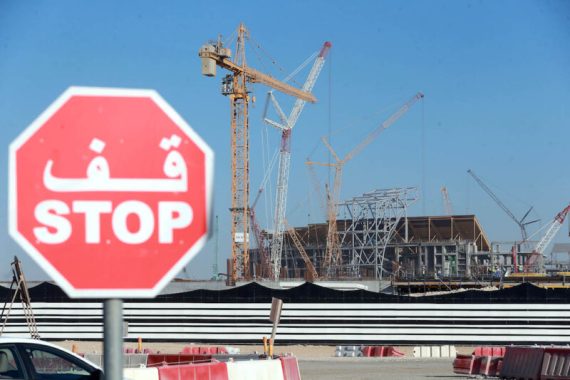Q
atar has become the first Middle Eastern country to host a FIFA World Cup football championship. However, critics have raised their voices about migrant workers’ living conditions and human causalities that reportedly occurred during the construction of stadiums and other organization-related facilities.
Qatar hopes that hosting the World Cup 2022 will significantly contribute to its national development and progress. Yet, certain western media outlets have called on Qatar for the conditions migrant workers have faced during the preparations for the World Cup 2022. Such bad publicity was the last thing Qatar wanted.
Workers’ conditions
30,000 foreign workers have moved to Qatar since 2010 when the country won the bid to become the FIFA World Cup host in order to aid in the preparation for the mega-event. These migrant workers came mainly from South-East Asian countries like Nepal and India.
Leading up to 2022, there have been concerns voiced among unions regarding the poor conditions of foreign workers in Qatar. Poor working conditions were detailed in the 2014 International Trade Union Confederation Special Report which also emphasized the conditions in detention centers, the Qatari legal system, corporate behavior, and labor inspections.
Given the pressures by the unions regarding the workers’ conditions and the deaths that have occurred on the government’s watch, the kafala system has been overridden, but concerns remain whether it continues and will continue in practice.
Kafala system
The kafala system is a law framework that is a bridge between migrant workers and employers, and relates to issues regarding international law and workers’ rights. The system allows for cheap labor, but is controversial as it paves the way for exploitation at the hands of employers or governments.
The system lacks “regulations and protections for migrant workers,” according to the Council of Foreign Relations, with workers becoming subject and exposed to poor working conditions, low wages, employee control, and abuse. This control means that employers are able to exert certain powers over the workers including changing their jobs, revoking their residence permits, and even deporting them. There is fear among workers about reporting abuses or the deteriorating situation of forced labor.
The system is predominantly seen in countries that have used this framework to help boost their rapid economic growth. The Gulf Cooperation Council (GCC) countries have fostered this system. Calls have been made to reform or abolish it due to the adverse effects it has on workers’ rights, and it has come to be regarded as a form of modern-day slavery.
Qatar took steps to abolish the kafala system in December 2016, and it was officially abolished in 2018. Thus, Qatar took considerable steps to align itself with international law and secure workers’ safety. The abolishment came alongside reform packages to enhance the labor market in Qatar.
The West reacts, but how?
When raising concerns over workers’ poor working conditions and lack of regulations, a special emphasis is paid to the number of deaths among workers in Qatar leading up to the World Cup 2022. However, there are serious inconsistencies with the numbers given.
David Mednicoff stated that there have been major reforms in Qatar thanks to the constructive pressure by unions and the International Labor Organization (ILO). Given the growing news on Qatar and the working conditions there, he highlighted that Western criticism may also conceal other agendas.
Mednicoff noted that the historic moment of Qatar being the first Middle Eastern country to host the FIFA World Cup was presented in an Islamophobic context in the French publication Le Canard enchaîné which depicted the Qatari football players as terrorists.
The Qatari Minister of State Dr. Hamad Al-Kawari responded to the publication, stating that “even caustic satire is welcome!!” He went on, “But the Chained Duck [Le Canard enchaîné] decided to resort to lies, hatred and resentment to attack Qatar and denigrate it. Keep some loyalty and sportsmanship at least.”
In fact, there has been pressure on Qatar since the bid for the World Cup 2022, and how it has all been portrayed is newsworthy in itself.
Recommended
Dispute of figures
The figures given by news outlets relating to the deaths of migrant workers are debatable. The Qatari government has slammed allegations of figures ranging between 6,500 to 15,000 as “lacking in accuracy” and has called on the International Labor Organization (ILO) as a referee.
Qatar has stated that there have been 37 workplace deaths directly linked to construction related to the World Cup between 2014 and 2020, while the ILO announced the figure as 50 in 2020.
The ILO has pointed out that “the figure of ‘6,500 deaths’, as reported in media outlets, has been extensively reproduced by many other sources, not always including the context and details of the original source, and often attributing these fatalities to the construction of World Cup sites,” referring to the Guardian’s 6,500 figure on the worker deaths in Qatar.
Amnesty International offers the figure of 15,021 obtained from official statistics from Qatari authorities on foreigners who have died in the country between 2010 and 2019. This figure is not directly connected to the World Cup and involves the large number of migrant workers in the country from Bangladesh, India, Nepal, Pakistan, and Sri Lanka.
The UN agency has stated that “the figures could be under-reported because of data weakness.” It also casts doubts on the figures since there is a lack of labor investigations. The kafala system, which had contributed to the lack of reported incidents concerning migrant workers as workers do not “report abuses or assert their rights for fear of retaliation, which further contributes to their situation in forced labour.”
Eight workers died in the construction work for the Brazil World Cup 2014 and 21 construction workers died in Russia during construction for the World Cup 2018. These deaths point to a worrisome picture of workers’ conditions and safety regarding the World Cup; however, they do not include figures of work-related deaths that are not related to World Cups.
Consistency as a value, transparency as trust
Qatar has responded decisively and effectively to the human rights issues that the country has faced, even taking considerable steps regarding the kafala system. Now, the Qatari state must ensure that the new laws and regulations in accordance with international law and workers’ rights are set into practice and do remain on paper.
The disparity in the figures and accusations of lack of transparency have led to inconsistencies in trust. A positive and unexpected effect of all this is that Qatar developed new laws surrounding workers’ rights in light of the international pressure. Maintaining these new developments will be another success for Qatar, since tough conditions for migrant workers under the kafala system have had huge effects to the lives of many individuals.
Consistency becomes vital in light of human rights, especially maintaining integrity for worker safety in newly developed policies. This is a meaningful step for Qatar, the first Middle Eastern country to host the World Cup and the first country in the Gulf Cooperation Council to abolish the kafala system.





